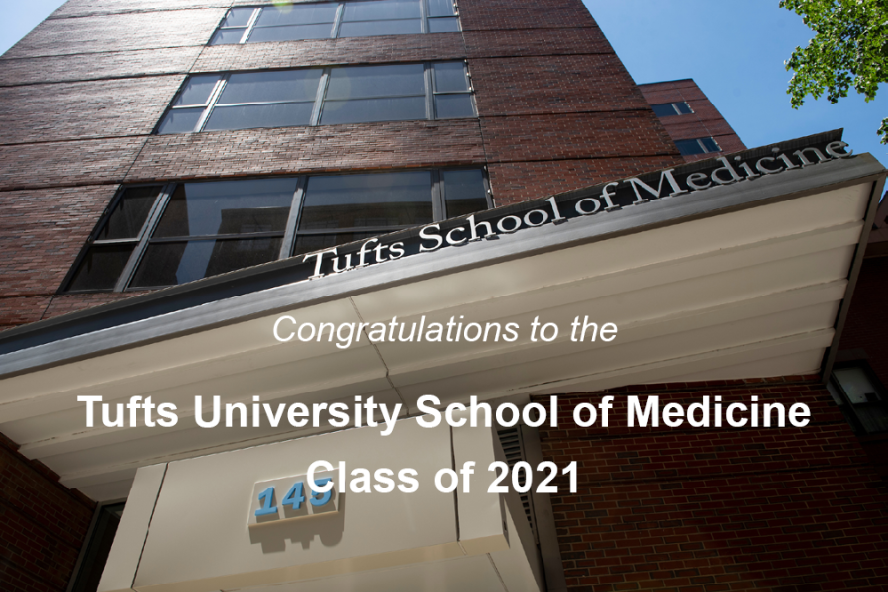-
About
- Departments & Offices
-
Academics
- Physician Assistant
- Special Master’s (MBS)
-
Admissions & Financial Aid
- Tuition & Fees
-
Student Life
-
Research
- Research Labs & Centers
-
Local & Global Engagement
- Global Health Programs
- Community Engagement
A Special Blend of Humanism and Science
Being a physician takes a special blend of humanism and science, something the Class of 2021 has in abundance

Being a physician takes a special blend of humanism and science, something the Class of 2021 has in abundance, Interim Dean Peter Bates told the MD recipients at the 129th commencement of Tufts University School of Medicine.
“You have shown your commitment to healing individual patients and helping to repair our world,” he said. “There is nothing more important or more needed right now.”
There was no ignoring that this year’s virtual commencement was not what graduates pictured when they began their medical school journeys.
“We are not sitting in a sunlit field in Medford and I am not speaking from a podium but rather this wobbly desk in my home in Maine,” said Spencer Scott, M21, the class president, in his address. “And to be totally honest, I feel a little bit silly sitting at my desk in this robe and cap.”
The biggest absence, he said, is not the pomp and circumstance and a stage to strut across, but the chance for the class of 2021 to be together again.
“I know we long to recreate those truly communal moments of our first and second years—the noisy interludes between lectures in the auditorium, the downright raucous energy at the beginning of a day in the anatomy lab, or the audible euphoria of M21 gathering in the halls of MedEd post-exam,” he said. “I long for those moments, because what we have shared is truly special.”
The events of the last year have laid bare “the inequities and injustices that deeply trouble our nation,” he said. As new doctors, the members of the class now have the power to make change, he said.
“I believe in the ability of this group, this class, this new generation of physicians to begin to right what has been wrong for so long,” he said.
Keynote speaker Pritesh Gandhi, A04, M11, MG11 (MPH), chief medical officer of the Department of Homeland Security, spoke of the role kindness plays in medicine. He talked about the speech therapist that he, as a young child who stuttered, went to visit several times each week.
“She created an environment by her kindness where I could succeed,” he said. “She exercised all of her training to help me, but . . . all I can remember now is how kind she was.”
“Be kind,” he continued. “But please don’t mistake kindness for lack of action. You can be kind, but be absolutely ruthless in your quest to build a better world for your patients and their families.”
He told the story of the patient—a bus driver who was unable to take time off from his job to attend to his health—who inspired the Austin, Texas, clinic where Gandhi worked to take the lead advocating for paid sick leave. It resulted in a paid sick leave ordinance in Austin in 2018.
“We all have the ability to make a difference in the world we live in,” he said. “And if for whatever reason you find that you are blocked from making a difference, then make a plan to overcome that obstacle.”